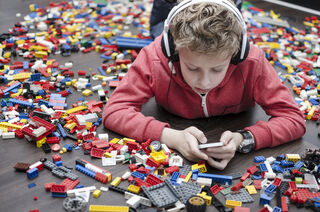Confidence
4 Ways Parents Can Increase Confidence in Their Children
Turn the tables on anxiety.
Posted October 1, 2021 Reviewed by Tyler Woods
Key points
- It is essential for children and teens to practice problem-solving skills to develop confidence.
- Children and teens experience anxiety when they are required to sit with a problem without having a solution right away.
- One of the best gifts parents can give their children is to allow them to fix mistakes on their own.
Anxiety is fundamentally a state of uneasiness about future uncertainties. In other words, anxiety often occurs when a person does not know what will happen next.

More kids are dealing with anxiety than ever before. There are two main reasons for this. First, we live in a fast-paced society with advanced technology that provides instant access to information. Instant gratification has become a way of life. Kids in this generation are so accustomed to getting things immediately that they can become easily frustrated, and even anxious, when asked to wait (Wiederhold, 2017).
Second, in today’s culture of raising children, there is a lot of pressure to provide them with every advantage to get ahead. There is more academic, extracurricular, and social pressure for kids now than with past generations. Parents and kids hear consistently how hard it is to get into a “good” college and the pressure is on to do more and do it better. This causes tremendous anxiety for children and teens.
Support vs. rescue
One of the most common mistakes that parents make is failing to recognize the difference between supporting their children and rescuing them.
When parents rescue their children from a conflict, they are “doing” it for them. By contrast, when parents support their children in solving the problem independently, they are “encouraging” the process of critical thinking and frustration tolerance. When children work to identify solutions on their own, they use problem-solving, social skills, and planning, while at the same time learning to tolerate the discomfort that comes from not feeling sure about the resolution. This process is essential practice for children and teens to develop confidence, and it is lost when they are rescued.
Instant gratification
Kids in this generation are so accustomed to getting things immediately that they can become easily frustrated, and even anxious when asked to wait.
Parents can increase confidence in their children by teaching them to tolerate waiting. Parents have the added challenge of raising children in the Instant Gratification Generation. This generation of children and teens has very little need to wait for anything. From On-Demand movies and television shows to smartphones, texting, and social media, there is very little delay between what they're looking for and finding it. To compound the issue, parents have also become accustomed to this pace, which very often translates into responding to their childrens' requests and desires quickly. That results in a lot of anxiety when kids are required to sit with a problem without having a solution right away. The best solution is to build in “waiting” for things from a very early age. Try not to drop everything to respond to the requests or needs of your children immediately. “Give me just a moment, I have to finish this task, and then I would be happy to help you figure out what to have for lunch.”
Developing patience
The best way to increase confidence in children is allowing them to develop the skills to have patience and consider resolutions to a problem when it arises.
One of the best gifts parents can give their children is to allow them to fix mistakes on their own. Parents will often tell their kids, “It is okay to make mistakes. Everyone makes mistakes.” However, that message is meaningless unless the kids are allowed to fix their mistakes themselves. If a child makes a mistake and a parent jumps in to fix it, this leaves the child feeling upset and possibly shameful. On the other hand, if the child fixes the mistake themselves, it fosters pride and confidence. It also reduces the fear of making future mistakes, which as we know, is inevitable.
Unstructured time
It is important for parents to recognize that children in this generation tend to lead very scheduled lives. That leaves minimal time to independently figure out what to do with unstructured, unplanned time away from the watchful eye of an adult.
One way to help children develop confidence is to allow them the independence to plan, organize, and improvise when given unstructured time. This experience is important in developing confidence. Children and teens need the freedom to make decisions, deal with unexpected outcomes, practice social skills, and mess up all on their own. Part of the practice is messing up and figuring out what to do about it. This instills knowledge and confidence that they can deal with future unexpected mistakes or outcomes on their own.
References
Wiederhold, B. K. (2017). How digital anxieties are shaping the next generation’s mental health. Cyberpsychology, Behavior, and Social Networking, 20(11), 661. http://doi.org/10.1089/cyber.2017.29089.bkw


